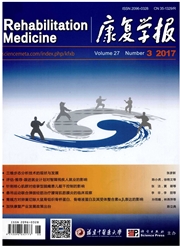

 中文摘要:
中文摘要:
目的:系统评价太极拳运动对脑卒中患者平衡功能的影响。方法:以"太极、平衡、脑卒中"等为主题词对英文数据库Pub Med、SCI、Cochrane Library以及中文3大数据库进行检索,收集2014年12月前发表的相关文献,并运用Review Manager 5.2软件进行Meta分析及文献质量评价。结果:最终纳入7篇文献,共涉及629名受试者。Meta分析结果显示,与常规康复训练相比,全套太极拳训练(MD=6.36,P〈0.01)及太极拳步法训练(MD=10.20,P〈0.01)均能显著改善脑卒中患者的BBS指数;与基础治疗(RR=0.30,P=0.01)和力量活动度训练(RR=0.30,P=0.01)相比,太极拳训练能显著降低跌倒风险。结论:太极拳运动可明显改善脑卒中患者的平衡功能,效果明显优于常规康复训练;今后需更多设计良好的大样本研究来证实其优越性。
 英文摘要:
英文摘要:
Objective:To systematically evaluate the effect of Tai Chi exercise on the balance function of patients with stroke.Methods:A literature search was performed in English and Chinese databases including Pubmed,SCI,Cochrane library,VIP,CNKI and Wan Fang,and "Tai ji""balance""stroke" were selected as keywords to obtain the original research articles which published before December 2014. The software of Review Manager 5.2 was applied for data analysis and quality assessment of eligible studies. Results:Seven studies with 629 participants were included. Compared with conventional rehabilitation training,Tai chi exercise and Tai chi gait training had positive effect on Berg Balance scale(BBS) index(MD=6.36,P〈0.01;MD=10.20,P〈0.01). Compared with routine care and movement exercises of strength,Tai Chi exercise reduced significantly the risk of fall(RR=0.30,P=0.01;RR=0.30,P=0.01). Conclusion:Tai Chi exercise can improve the balance function of patients with stroke,and its effect is superior to conventional rehabilitation training. However,more larger-scale well-designed trials are needed to confirm the superiority of Tai Chi exercise.
 同期刊论文项目
同期刊论文项目
 同项目期刊论文
同项目期刊论文
 期刊信息
期刊信息
